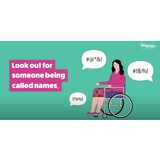Physical abuse is when someone causes another person pain or harm, like kicking or spitting. Look out for bruising, scratches, broken bones - or someone who seems scared of another person.
We all have a responsibility to make sure that we help protect vulnerable adults or children from abuse or neglect.
This is called safeguarding.
Abuse can be physical, sexual, domestic, emotional, financial or organisational.
Abuse can also mean exploiting someone, discriminating against them, or someone neglecting their own or someone else’s needs who depends on them.
Those most in need of protection include:
- Children and young people
- Adults at risk, such as those receiving care in their own homes, people with physical, sensory and mental impairments, and those with learning disabilities.
You can help protect adults and children from abuse and neglect by knowing how to spot the signs and taking action.
Types of abuse
Sexual abuse is when someone is forced to take part in sexual activity. Or when someone speaks to another in a sexual way about their body. They might share sexual videos of them without their consent. Look out for if someone seems quieter than normal and uses words or bad language they wouldn’t normally say.
Domestic abuse is when someone is abused in their home by a family member or a partner. Look out for someone who is controlled over what they say and stopped from seeing their family or friends. They seem scared of someone in their home. They may have bruises.
Emotional abuse is when someone says cruel or hurtful things to control or bully another person. Look out for someone being laughed at all the time and called names, or sometimes not listened to and ignored.
Financial abuse is when someone uses another person’s money or credit cards without permission or takes their benefits. Look out for if someone has no money for food or bills or where money goes missing.
Organisational abuse is when someone or an organisation who is paid to care for people don’t do what they should. Look out for someone not having a choice about when they go to bed or what they eat. They are punished for speaking out.
Discrimination is when someone is unfairly treated because they are thought to be different because of age, race, gender or disability. Look out for someone being called names, not given the services they need or not treated with respect
Modern slavery is when someone is forced to do work they don’t want to do without pay. Look out for someone who is being forced to work and threatened with violence while they are working.
What to do if you have a safeguarding concern
If you think you or someone you know is being abused or neglected, you should tell someone you trust.
This could be a friend, a teacher, a family member, a social worker, a doctor or healthcare professional, a police officer or someone else you trust. Ask them to help you report it.
Supporting people when concerns are raised about abuse or neglect can be very difficult and distressing for everyone involved. Deciding what the right thing to do can be stressful, particularly if the person you are concerned about is reluctant to accept support. If you are not sure what to do, you can always seek advice.
To report a crime
In an emergency, contact the police, call 999.
If the person is not in immediate danger, call 101 or report it online.
Other ways we can help
Please get in touch with us if you have any concerns about safeguarding.

Can't find what you're looking for?
Get help from our friendly Customer Contact Team.
